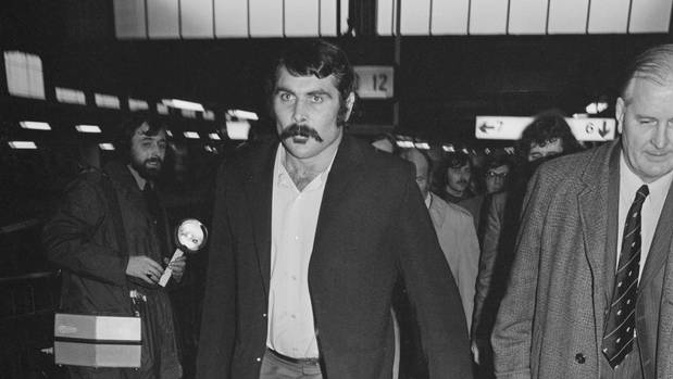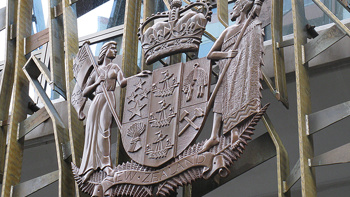
The final days of Keith Murdoch's life have been revealed by the few people who got to know the former All Black as he hid out in the Australian outback.
The tragic Murdoch story, after he was sent home from the 1972/73 tour of Britain and France, has never fully been told, such was the secrecy in which the big rugby forward lived.
Perth Now reporter Tony Barrass has gathered more pieces of the Murdoch mystery, his Sunday Times story beginning with the line "For 40 years, he roamed the vast expanses of the interior, drifting from one job to the next, a big man of few words who kept his eyes low and his head down".
Murdoch passed away, aged 74, in February and is buried in tiny Carnarvon where "no one knew Murdoch's secret. No one. Everyone just knew him as Keith, the big bloke who sat in the corner and didn't say boo".
The second, bizarre chapter in Murdoch's life began in Cardiff, December 1972. Hours after scoring a try as Ian Kirkpatrick's All Blacks beat Wales at the famous Cardiff Arms Park, the famously strong Murdoch had a physical confrontation with a hotel security guard.
Sent back to New Zealand, he quit the flight in Singapore and headed for Darwin and was barely seen in public again, fending off any media attempts to draw him into the open.
/arc-anglerfish-syd-prod-nzme.s3.amazonaws.com/public/DLRJNBOT4VCJZAHJFFSP3TF6OY.jpg)
All the while the Murdoch legend grew, as did sympathy for the Otago player over the way he had been treated.
Murdoch, who is believed to have returned to New Zealand a few times, was not about to break cover, however, sympathy or no sympathy.
"Romanticised by the Australian outback and embellished by hundreds of possible sightings over the decades, the Murdoch story became folklore," Barrass — an Australian journalist who has worked in Auckland — reported.
The story revealed that Murdoch "headed west a decade ago from the Northern Territory". He ended up in Carnarvon, a coastal town 900km north of Perth, population less than 5000.
There, a local car dealer from New Zealand called Graham 'Kiwi' Jackson said he was "floored" to find out the Keith Murdoch who had died in the town was THE Keith Murdoch.
A 53-year-old electrician named Dean Parry was said to be among the few people Murdoch trusted, making him next of kin during the final days. Yet even Dean was kept in the dark, during a 10-year friendship which involved regular meetings at the Gascoyne Hotel, as to who his big mate really was.
The Sunday Times reported: "It was only after his death in Carnarvon Hospital on February 27 that Dean found out the true identity of his closest friend through Murdoch's New Zealand-based sister, Barbara, who travelled to the town, a nine-hour drive north of Perth, to bury her brother."
/arc-anglerfish-syd-prod-nzme.s3.amazonaws.com/public/24HKGZ5AZFDQRHXDLYFIUPMO7Y.jpg)
Another interviewee named Drew Vandeleur remembered the "big bastard" looking for work as a bulldozer driver at his earthmoving operation.
It was a job for loners, prepared to sleep rough.
"He could be a bloody prickly character, but he was pretty reliable in a business where you get a lot of strange people coming and going," Vandeleur told the paper.
"...you couldn't get two words out of him and as soon as I got him working with the confines of a team, or another person, he was off. I don't think he liked people very much."
Murdoch's standard outfit was blue shorts, thongs and a blue short-sleeve shirt. He was "often found sitting on a bench outside the pub in the smoking area, the non-smoker who was fit as a mallee bull until his last months never offered up conversation as he watched the evening's passing traffic".
Murdoch, who bet on horse and greyhounds races, lived in a small unit near the "Gassie" pub. A daily routine included walking to pick up the morning paper.
The Sunday Times painted a picture of a man who regularly pounded the pavements in purposeful style, perhaps with the aim of keeping fit.
He liked to camp under the stars, alone, and could disappear into the bush for months.
/arc-anglerfish-syd-prod-nzme.s3.amazonaws.com/public/FQOY72CTIVAE3MXRX2Z2F4JNDA.jpg)
His best "mates" included Parry's border collie Sally, who "adored" big Keith.
Murdoch requested that Sally be allowed to stay at his pensioner unit when Murdoch knew his death was near.
There was one report of Murdoch getting tough, with a troublesome drunk.
"I didn't hit him hard but I did make him cry," Murdoch told Dean.
Dean told the reporter he was still "stunned by it all" and didn't even realise Murdoch's heritage, any Kiwi twang having apparently disappeared.
He believes the pair watched television coverage of the 2011 World Cup final, when the All Blacks beat France at Eden Park when Murdoch muttered: "I used to play rugby."
Dean said: "Apart from that, I watched plenty of games of rugby with him and he never mentioned a word.
"I'm proud to say that I was his best mate. He was a very quiet man, but he often opened up to me. He enjoyed discussing current affairs and things that were happening in the world.
"I would invite him over for a meal...he was a wonderful man. I miss Keith."
Dean believes Murdoch had found a measure of peace.
"When we talked, he was happy to talk about what he done and what he enjoyed — and that obviously wasn't football," he said.
"So, I don't blame him for not telling me. We loved Keith for who he was — not for who other people thought he was."
Kiwi Jackson was a pallbearer at Murdoch's funeral, which ended at the Carnarvon cemetery next to the North West Coastal Highway.
"Christ, he was heavy," the 71-year-old said.
"Then we had to shovel the dirt on top of the big bastard. It was a job-and-a-half, let me give you the tip."
Among the speakers was Murdoch's sister who recalled that the family was "over the moon" when he first became an All Black.
She then rested Murdoch's All Black cap on his cross.
Take your Radio, Podcasts and Music with you









